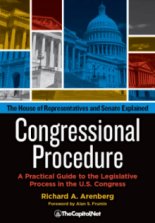Amending the Constitution (CongressionalGlossary.com)
From the Congressional Glossary – Including Legislative and Budget Terms Amending the Constitution How to Amend the U.S. Constitution One of the ways in which federalism is most clearly expressed in the Constitution is in the process for its amendment. Nine of the thirteen original states were required to ratify the … Read more



